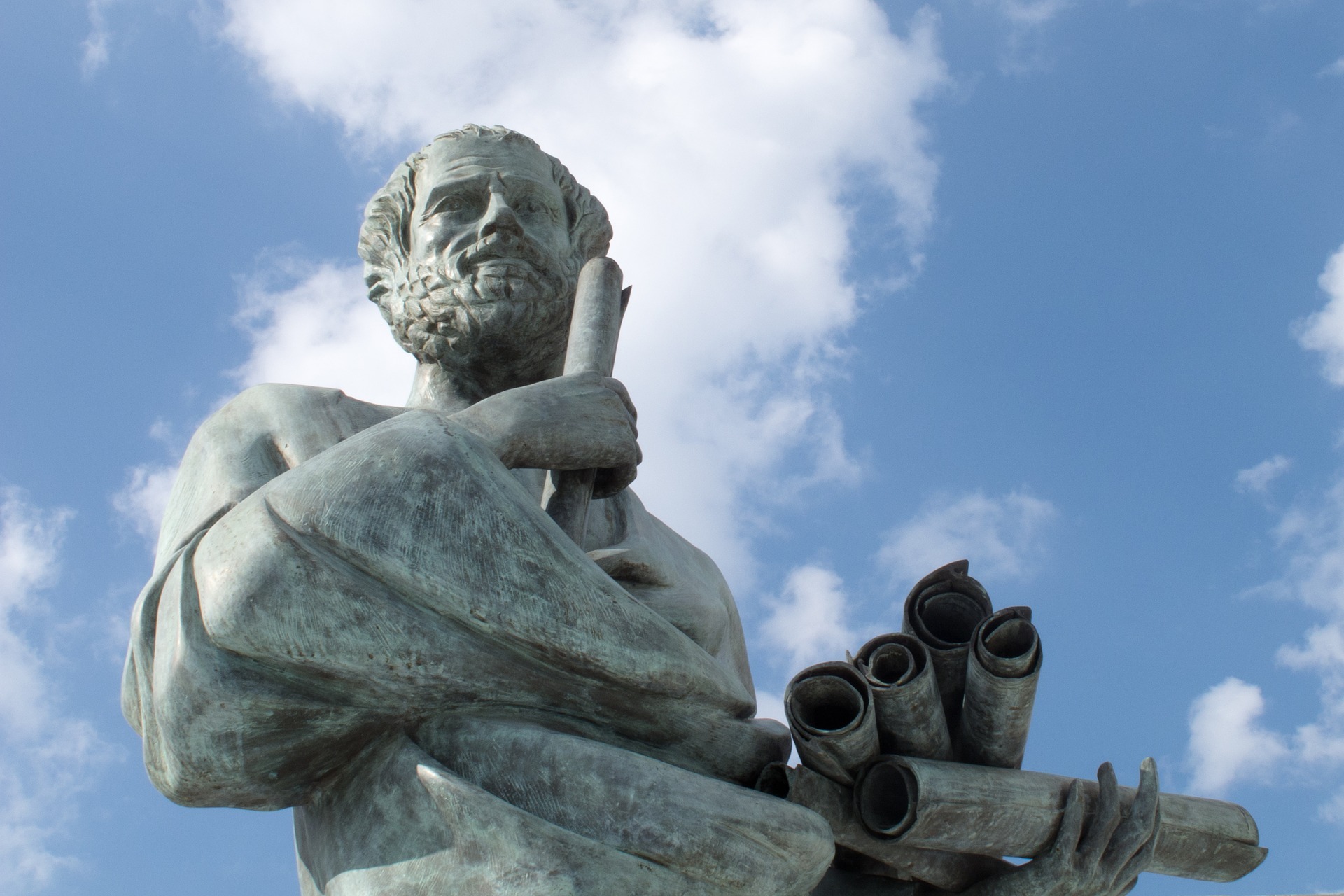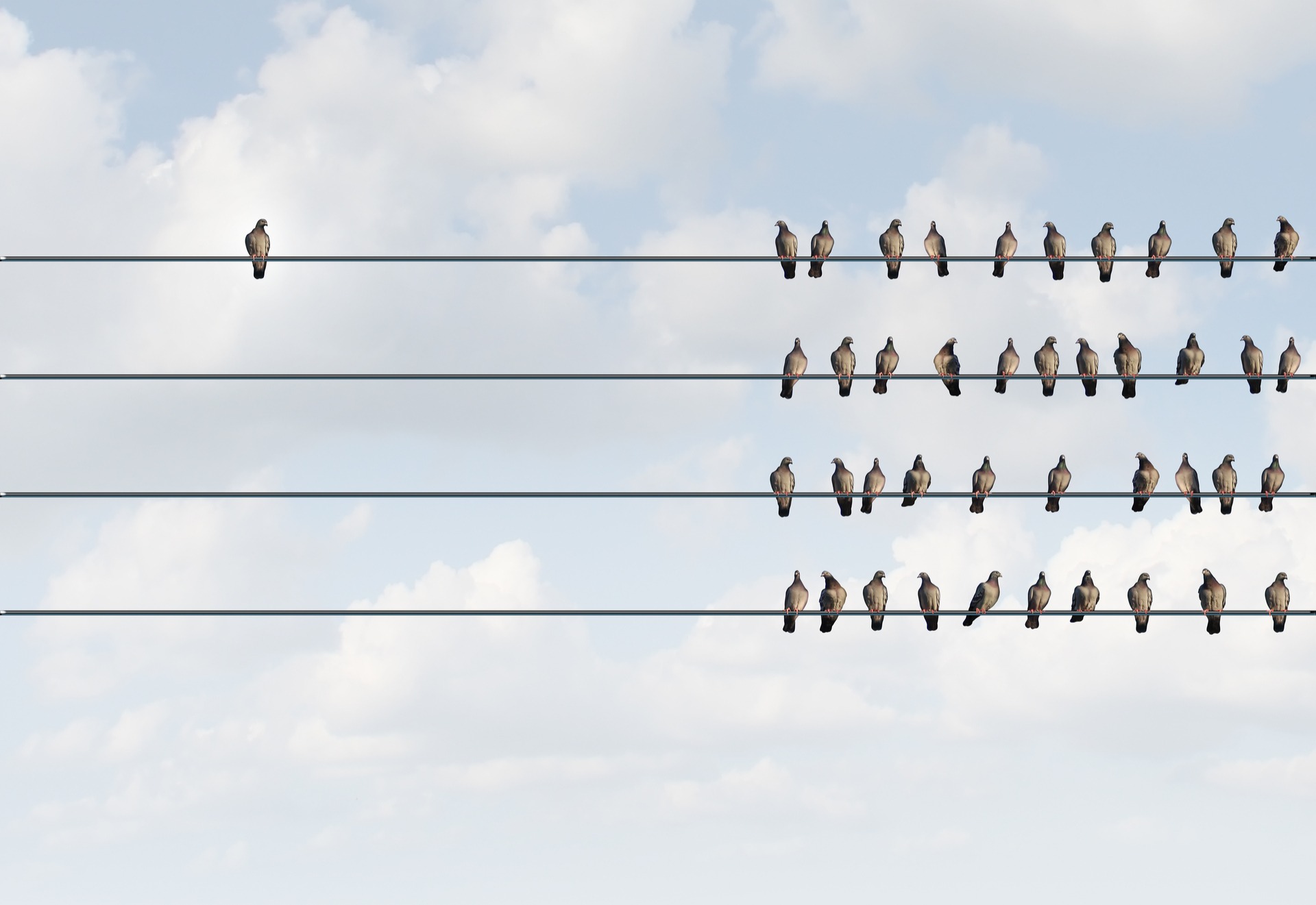Be creative. Think outside the box! Push the envelope and, above all, dare to be different!
I am certain you have heard expressions like these many times. If not, just pay a visit to any bookstore and browse available titles in the business, psychology, management, or leadership sections. You are bound to find a number of titles expressing one or all of these sentiments in one way or other. They all have in common that they encourage you to be as unique as possible, to be a largely self-made man or woman, and most of all, that all things are possible if you apply yourself and refuse to give in. The messages communicated, however, are based on two rarely questioned but exceedingly dubious assumptions:
First, to be a unique individual is always something positive and is necessary for future success. Second, success is available to all if they apply themselves tenaciously and relentlessly.
Putting it somewhat crudely, the idea is that it is always better to fight for something and die trying than to surrender and admit defeat. There is glory and respect tied to the former, whereas shame and scorn will probably be the result of the latter.
This is a seriously flawed dichotomy based on untrue premises. Importantly, these beliefs stem from cultural values rather than objective knowledge of human behavior.
Having spent 25 years or so researching and studying giftedness and talent, I have been astonished to find the same ideological message uncritically accepted and touted by a majority of scholars. They have devoted their lives to studying the conditions for and the dynamics of extreme human abilities. The results of this have generated several doubtful but popular notions, such as grit, mindset, flow, and deliberate practice. All of these, in different ways, are suggesting that you are able to control your own destiny. There are always ways of “fulfilling one’s potential” if you stick to the advice provided.
But what does it even mean to fulfill one’s potential? It is just as undefinable as the elusive notion of success. Perhaps a reasonable definition of both would be to say that you have fulfilled “your potential” and achieved “success” when others think that you have. If so, you have no say yourself in determining when you have arrived.
I have found that many suggestions on how to prosper and make your way in life are based on the rhetoric of ideals—and such ideals do not measure up well to what we now know of human behavior. These ideals, however, exist for a reason. While usually untrue and irrational, they are neither random nor nonsensical. They enable the human species to evolve and adapt.
The Intelligent Ape: Collective and Not Always So Clever
Needless to say, we all belong to Homo sapiens. Other species of humans are long since extinct. All types of hominids, however, have been fundamentally social by nature and function. Homo sapiens is not a species of unique, independent individuals. We are a collective of members whose characteristics are normally distributed by evolutionary design. We all share the same genome in terms of number of building blocks, but we differ genetically from one another by up to 12%, according to the most recent research. This window of variation is evolution’s laboratory: it differentiates our species randomly for better adaptation to the world we live in.
This fact limits what we are able to do and to achieve. We are much less the engineers of our own destiny than we would like to believe. We are often convinced that we are in full control when chance is really in charge.
Consider, for instance, recruitment for managerial positions. A few clever Italian mathematicians and computer scientists wanted to test the so-called Peter principle, which suggests that people in organizations tend to be promoted towards their own incompetence. As one ascends to higher positions, one also becomes increasingly ignorant and unsuitable for those positions. The scientists’ conclusion made worldwide headlines a few years ago. They found—no doubt to the chagrin of many an exorbitantly paid recruiter and HR department—that the best way of improving efficiency in an organization is far removed from selecting and promoting candidates based on merit, experience, and suitable personal characteristics. On the contrary, it seems there is a better chance of success if, from a group with both the worst and the best performers in the organization, a manager is selected and promoted completely at random. In later studies, they somewhat alarmingly also found that same goes for politics and government.
In the ongoing evolution of our species (not to mention of other apes), groups are socially glued together by the dynamics of similarity. Being too different from most others is not generally positive. It is therefore not surprising when extremely gifted individuals of any age try to fit in by hiding skills and abilities as best they can, often refusing even to acknowledge that they are gifted or in any way different.

When one is required to conform to the behaviors of one’s social reference group, hiding one’s uniqueness is rarely, if ever, successful. For extremely gifted individuals, the options for achieving similarity and conformity are limited.
But when one is required to conform to implicit cultural norms and to the behaviors of one’s social reference group, hiding one’s uniqueness is rarely, if ever, successful. We all have a basic need to belong, to share an identity with others; and we all have a need to establish our own identity within our collective. But on balance, we are programmed to be more alike than different. And for extremely gifted individuals, the options for achieving similarity and conformity are limited.
The Origins of Our Optimism
One of evolution’s more clever mechanisms is to bias all of us towards remaining hopeful no matter what. When this mechanism fails, we are in trouble and risk both mental and physical health problems. As social psychologists have known for decades, we are much more likely to opt for hope than to expect doom and disaster. Our default mode is eternal optimism.
Moreover, we do not care much for people who do not share this optimism. Illusion is an intrinsic part of being human, too. But this built-in mechanism has no relation to objective truth. We can stare disaster in the face but continue arguing that we will overcome the problem, despite having overwhelming evidence to the contrary. This has survival value for Homo sapiens as a species. But it’s not helpful for our efforts, as individuals, to understand objectively how our world actually functions. Have you never wondered why the grim warnings on packets of tobacco products have little to no effect? People rationalize. They may be dangerous to others, but not to me.
When gifted people try to communicate that we are staring disaster in the face, they are rarely met with enthusiasm. Their insights threaten the illusion that protects humanity from falling down into a pit of possibly paralyzing depression.
Intellectually gifted individuals are some of the most well equipped to see beyond these illusions. They frequently do. But when they try to communicate what they understand—despite their admirable intention to help everyone and perhaps prevent impending disaster—they are rarely met with enthusiasm. Their insights threaten the illusion that protects humanity from falling down into a pit of possibly paralyzing depression. And so their collective either ignores the threat, renders it powerless, or eliminates the messenger entirely. History is replete with disheartening examples.
The Elusiveness of Belonging
Of course, many gifted people do contribute to group cohesion. I’m referring here to the talented athletes, actors, musicians, and authors, among others, who are appreciated, celebrated, hailed as role models, and highly rewarded for the social function that they perform in our society.
Those who could threaten social cohesion or structure, however, will always be met with suspicion, no matter how talented they are. While groups differ in values, practices, and degree of tolerance, they all have limits for what is acceptable or permissible. Breaching these boundaries of often tacit but nevertheless expected conduct will have repercussions.
The gifted individual therefore faces a two-fold challenge: achieving both self and social acceptance.
He or she will be unable to identify with most others and will therefore wonder what is wrong. Self-blame comes all too easily to such a person. But of course, nothing is “wrong.” The gifted individual is only very different in comparison to almost everyone else. Accepting this difference, rather than trying to pretend to be something you are not, tends to make life much easier. Self-acceptance is a basic necessity for survival.
He or she simultaneously risks being excluded by others on account of this difference. All of us have a natural drive to be like others in our social reference group—and others will see you as a threat to that present group norm. It will therefore be difficult for mainstream society to accept you.
Both of these obstacles are likely to pose a life-long challenge to any intellectually gifted person. Add to this that any kind of socially valued and recognized success always hinges on acceptance by—and inclusion in—mainstream society. This acceptance hinges on the majority—which means that their norms, their understandings, and also their average ability levels, must always be accepted and never challenged. These are the conditions for being embraced by society at large.
Needless to say, the conditions for success as defined by society are difficult, if not impossible, for extremely gifted individuals to live up to or even accept. They demand submission and conformity. But uncritical conformity is rarely something that the gifted are keen to offer. On the contrary, logic and rationality more or less constitute the air they breathe. But the absence of both also constitutes the nature of politics at every level of human society. Homo sapiens is indeed a political animal, and intellectually gifted individuals are generally ill-equipped to play political games.

Add to this picture potential communication problems going both ways. The average majority cannot easily comprehend what the gifted individual represents or is trying to convey. He or she will appear odd and eccentric at best. And while this individual may understand the majority view, he or she usually has not developed the patience to do so. For a better social fit, he or she must learn to communicate on a level that is understandable and acceptable to the majority. This is not an easy challenge for anyone.
In this light, it is easy to see why a brilliant mind is never guaranteed a successful career anywhere on the world stage. In fact, I would argue that no political leader anywhere is an intellectually gifted individual. It would constitute a paradox to the knowledge we currently have of how human nature functions. Political leaders might be accomplished, more or less knowledgeable, and some are no doubt more likeable than others, but as University of California scholar Fredrick G. Bailey has suggested, the road to power is only made possible by “humbuggery and manipulation.”
A Tower of Power Misunderstood by Most
It is possible to be too creative as well as too clever. You are probably familiar with the MacArthur Fellows Program, also known as the “Genius Grants.” The MacArthur Foundation in Chicago, Illinois awards “unrestricted fellowships to talented individuals who have shown extraordinary originality and dedication in their creative pursuits and a marked capacity for self-direction.” Few of these fellows have pursued their interests without resistance and suspicion from the world around them. Some managed to gain wider acceptance after having been given the award, while others probably gained only the acceptance of the MacArthur Foundation.
Who gains acceptance depends on a number of factors. Does what you do somehow strengthen societal identity? Does it represent knowledge and insight that might potentially pose a threat to others? Or do your knowledge and insight risk undermining the status and credibility of highly paid executives or officials? It is also possible that your pursuit and achievement, while astounding and unique in its own right, may have no or little social consequence to anyone except to yourself, in which case it would be harmless for anyone in society to acknowledge you.
Research has shown that few like to work with a very intelligent know-it-all. If you end up working in a team of members not as skilled and knowledgeable as you are, they will probably develop a dislike for you. This is not because you are in any way socially inept or unpleasant. You may well be more of a “people person” than they are. But you are different in comparison to them—perhaps even very different. This is why you challenge team cohesion. The social dynamics would be exactly the same in a group of utterly brilliant individuals if they had to work with someone more average. They would group together and show frustration with—or even develop a dislike for—the less brilliant group member, whose only flaw is that in comparison to them, he or she is too different. Human nature is fundamental also to the gifted and talented!
The average rule the world by force of normal distribution. That is, the level of any majority, whichever level this might be, will be the dominant force to which everyone in that particular context must relate for acceptance or at least tolerance.
The history of music and art is full of misunderstood individuals. They completely broke with accepted traditions and norms. As a rule, they were scorned, or even harassed, by their contemporaries because of it. Only few enjoyed acceptance and respect in their own life time.
The modern mantra of creativity, innovation, self-determination, and being unique, by means of grit, mindset, flow, or enforced training or practice to reach one’s full potential, rings hollow when comparing it to the real-life experience of brilliant minds throughout history. The glorious halo of greatness often associated with historically recognized talent and brilliance is usually a post hoc construction by later generations. The history of music and art is full of misunderstood individuals. They completely broke with accepted traditions and norms. As a rule, they were scorned, or even harassed, by their contemporaries because of it. Only few enjoyed acceptance and respect in their own life time. It takes time for society to become familiar with something new. Only rarely are novelties affecting social dynamics accepted for what they are. Status quo is the preferred choice when a population has reasonable security and their basic needs are met. Most construct their understanding of the world from that which is already known and familiar. Change, whatever it consists of, needs to be slow and subtle for general acceptance.
When the Illusion Shatters
Allow me to quote an extremely gifted young man who recently contacted me at the University. (I have removed some information to allow for anonymity.) He desperately sought an explanation of why no one seemed to appreciate his brilliance and insights. He had adamantly tried to make his career as a hard-working student and later as a scholar at the most prestigious universities that the world has to offer. By his own initiative, he studied most of the literature he could find on giftedness and talent. But he did not find an answer to the one question that haunted him the most: Why is brilliance not always welcome where it reasonably should be acknowledged or even applauded?
The following is an excerpt of what he wrote to me, after reading and reflecting on the answers that I did my best to provide:
I have seen that most people instill in the young the idea that everything is possible, thinking that, by doing so, they will encourage them to be active in the world. I think the idea is dangerous, as many empty ideals, because it distorts the image of life for the young, who will associate their failures with insufficiency of the environment or lack of resources or… instead of seeing that life itself is a struggle to lift limitations and expand one’s sphere of activity … To have a realistic view of one’s possibilities could be disheartening at first, but the initial pessimism can be followed with actions that are more adapted to “the real world” and therefore more efficient.
This is by no means the only example I have encountered during my almost 25 years of researching the field, but it is perhaps the best example. It so clearly demonstrates how fickle the societal promise of success and ‘possibilities for everyone’ is. A few, no doubt, manage to accomplish what they set out to do in spite of society’s inherent resistance to extreme divergence. But I think it is much more common to be stunned by unexpected and seemingly inexplicable disinterest—or even hostility, like with the brilliant young man I quoted above.

It is human nature to ignore the songs of unsung heroes. People generally want illusions. They will gladly create ideals with impossible attributes to admire.
Beware of Hubris Syndrome
But there is one more problem we must address. The few unusually bright people who do somehow make it to the pinnacles of power and influence will face another rather sinister problem of which they will not usually be aware. They are more than likely to develop a less than socially acceptable personality, especially if they value career and promotion highly and have, as recruiters sometimes like to put it, a hunger for achievement and success.
Consider the following: It has been shown that a majority of American presidents and British prime ministers over the years have developed hubris syndrome. This is an enduring personality change. It leads the increasingly influential person to see the world as a place for self-glorification through the use of power; to tend to take action primarily to enhance personal image; to exhibit messianic zeal and exaltation in speech; to show excessive self-confidence; to manifest contempt for others; to lose contact with reality; to resort to restlessness, recklessness, and impulsive actions; and to display incompetence in and disregard for the nature of policy making, to mention only a few of the fourteen proposed criteria of the syndrome. Other research has established that the same seems true of a great many captains of banking as well. Perceiving oneself as increasingly important and influential changes people physiologically. Personal characteristics will transform towards the insensitive and abusive. One’s understanding of reality will change to become increasingly less compatible with that of others. This, too, is evolutionary design.
A majority of American presidents and British prime ministers over the years have developed hubris syndrome, in which an increasingly influential person comes to see the world as a place for self-glorification through the use of power.
Human behaviour is complex. It is only in the last few decades, with the arrival of greater computer power, big data, mapping the human genome, and an increasing understanding of epigenetics, that we are beginning to understand just how complex human behaviour is. Findings have revealed how the human species moves as a collective. This knowledge is now a basis for how large cities are planned and structured.
But alarmingly, this knowledge has not yet been embraced by much of the social sciences and particularly not by education and educators. Given that we are exceedingly prone to choose illusions rather than facts because illusions are designed to make us “feel good,” it is no wonder that much scholarship is still ignoring very fundamental truths of the social dynamics of Homo sapiens.
How to Lead a (Reasonably) Happy Life
All of this leads to a simple question with no absolute answer: How should individuals who are so different in comparison to the rest of a population try to establish a life of reasonable contentment? Happiness, like freedom, is an elusive concept. It is more of a perception than it is something tangibly defined by rules and traditions. It should be clear that for an intellectually gifted individual, happiness is rarely found in a generally recognized stellar career involving influence, awards, and coveted positions in which others determine what counts as success and potential.
A few years ago, I read interviews with two of the highest-scoring Mensa members in Sweden and Norway. Both are respected and admired by other Mensa members, though neither is an admired intellectual giant in the limelight of society. One sold music systems for cars in a remote Norwegian community. The other ran a small bakery in the Swedish countryside, far from Stockholm.
The Norwegian journalist who interviewed the salesman could not make heads or tails of why such an extremely intelligent individual did not devote his life to a spectacular career by, for example, trying to find a cure for cancer. Very unprofessionally, he mocked him as the interview progressed.
The Swedish journalist was puzzled as well but did not resort to ridicule. It was inconceivable to him, too, that someone so intelligent should allow themselves to “waste” their skills on making bread in the middle of nowhere.
For an intellectually gifted individual, happiness is rarely found in a generally recognized stellar career involving influence, awards, and coveted positions in which others determine what counts as success and potential.
Both the Norwegian and the Swede, however, calmly gave the two journalists exactly the same and very disarming answer: What I do now makes me happy!
Incidentally, I became a victim of the same Norwegian journalist myself. He did not care for me, either. I did not reply to his questions the way he expected. He wanted me to say that talent is overrated (which happened to be the title of a book he had read and kept using as an argument). I told him to some extent what I have written here.
I do not think that my university was particularly pleased when the published interview appeared in a Norwegian newspaper a few days later. It described “a grumpy Swedish professor with the looks of an outdated wrestler,” which hardly communicated the marketable glory and status of which society is so fond. In this case, however, the reality was different from this widely marketable but illusory honor and glory. The reality was indeed a grumpy professor with the wrong looks and the wrong knowledge, who was not in the least tempted to flirt with opportunism and flawed assumptions, even though both of which no doubt would have offered career brownie points.
On a more personal note, I am content with my own life. I stand adversity by knowing what I know and constantly seeing it confirmed. This is immensely rewarding but often also saddening. To know the solution to a problem but be ignored and not allowed to help is onerous. However, I now know who I am.
It has taken a number of difficult years to get there. Importantly, there is inevitably a price to pay for this. To consistently keep integrity, standards, and an undying concern for the value of others makes a stellar academic career nigh-impossible. This is a choice that I have very intentionally made. I did not even want to become a full professor when I had accumulated enough research and experience. It took considerable convincing before I reluctantly accepted it. It was a bonus to the university to add yet another full professor to its ranks of scholars, but it really did very little for me and my own scholarly interests. I was simply not interested in the generally accepted career pattern. I have learned to decide for myself what success is. The “potential” which I may or may not have, I do not care much about. I do what I do anyway because I love doing it. Moreover, I know what the infamous rat race does to people no matter how well-intended they initially are. I have yet to meet anyone who has fared well in opting for an alluring career towards great influence and power. No one I know of has remained the same.
I now know why. This is human nature in action. We were never designed as a species to exist in formalized organizations. We were rather designed by evolution to self-organize into groups.
Leading a life that is “different”—the inevitable fate of all who are intellectually gifted—is certainly possible. While both gifted and nongifted lives must always relate to the larger society, all of its rules and traditions cannot always apply to the intellectually gifted when seeking personal success and contentment. Society will always measure you against its illusions and its wishful thinking, but these should not define happiness and contentment for you. It seems to me that it is far better to understand limits, acknowledge the impossible, and act accordingly, than to ignore that limits exist, pretend that all things are always possible, and launch an inappropriate goose chase after unreachable goals that aren’t really yours to begin with. One is infinitely more likely to be conducive to health and relative well-being than the other.

Selected References and Suggestions for Further Exploration
Andrews, P. W., & Andersen-Thomsen, J., Jr. (2009). The bright side of being blue: depression as an adaptation for analyzing complex problems. Psychological Review, 116(3), 620-654.
Baily, F. G. (1988). Humbuggery and manipulation. The art of leadership. Ithaca, NY: Cornell University Press.
Conroy, J. P. (2013). Executive hubris: the case of a bank CEO. Accounting, Auditing and Accountability Journal, 26(2), 172-195.
Crocker, J., & Quinee, D. M. (2003). Social stigma and the Self: meanings, situations and Self-esteem. In F. H. Heatherton, R. E. Kleck, M. R. Hebl and J. G. Hull (eds.), The social psychology of stigma (pp. 153-181). New York: The Guildford Press.
Fernández-Armesto, F. (2005). So you think you’re human? Oxford. UK: Oxford University Press.
Fiedler, E. D. (1999). Gifted children: the promise of potential/the problems of potential. In V. L. Schwean, & D. H. Saklofske (Eds.), Handbook of psychosocial characteristics of exceptional children (pp. 401–442). New York: Kluwer Academic/ Plenum Publishers.
Foust, R. C., Rudasill, K. M., & Callahan, C. M. (2006). An investigation into the gender and age differences in the social coping of academically advanced students. Journal of Advanced Academics, 18(1), 60-80.
Hatemi, P. K., & McDermott, R. (Eds.). (2011). Man is by nature a political animal. Evolution, biology, and politics. Chicago, IL: University of Chicago Press.
Judge, T. A., Colbert, A. E., & Ilies, R. (2004). Intelligence and leadership. A quantitative review and test of theoretical propositions. Journal of Applied Psychology, 89(3), 542-552.
Kelly-Streznewski, M. (1999). Gifted grown-ups. The mixed blessings of extraordinary potential. New York: John Wiley & Sons.
Mezulis, A. H., Abramson, L. Y., Hyde, J. S., & Hankin, B. L. (2004). Is there a universal positivity bias in attributions? A meta-analytic review of individual, developmental, and cultural differences in self-serving attributional bias. Psychological Bulletin, 130(5), 711-747.
Nettle, D. (2004). Evolutionary origins of depression: a review and reformulation. Journal of Affective Disorders, 81, 91-102.
Nishida, T., Hosaka, K., Nakamura, M., & Hamai, M. (1995). A within-group gang attack on a young adult male chimpanzee: ostracism or an ill-mannered member? Primates, 36(2), 207-211.
Owen, D., & Davidson, J. (2009). Hubris syndrome: An acquired personality disorder? A study of US Presidents and UK Prime Ministers over the last 100 years. Brain—A Journal of Neurology, 132, 1396-1406.
Persson, R. S. (2005). Voices in the wilderness: Counselling gifted students in a Swedish egalitarian setting. International Journal for the Advancement of Counselling. 27(2), 263-276.
Persson, R. S. (2007). The myth of the antisocial genius: A survey study of the socio-emotional aspects of high-IQ individuals. Gifted and Talented International, 22(2), 19-34
Persson, R. S. (2009). The unwanted gifted and talented. A sociobiological perspective of the social functions of giftedness. (pp. 913-924). In L. V. Shavinina (ed.), International handbook of giftedness. Dordrecht, NL: Springer-Science.
Persson, R. S. (2014). Through the looking-glass: understanding the social dynamics of human nature and gifted identity. In R. Klingner (Ed.), Make them shine: identification and understanding of gifted children under consideration of their social and emotional needs. (pp. 37-76). Zurich, CH: LIT Verlag.
Persson. R. S. (2015). High ability and dreams of innovation and prosperity in the emerging global knowledge economy; A critical analysis of changing orientations in research and practice. International Journal of Talent Development and Creativity, 2(2), 15-34.
Persson, R. S. (2016). Human Nature: the unpredictable variable in engineering the future. In D. Ambrose & R. J. Sternberg (Eds.), Giftedness and talent in the 21st century. Adapting to the turbulence of globalization (pp. 65-80). Rotterdam, NL: Sense Publishers.
Persson, R. S. (2018). Evolved human giftedness: Reclaiming science from ideology, dogmatism, and self-serving bias. Ulm, DE: International Center for Innovation in Education (ICIE).
Pluchino, A., Garofalo, C., Rapisarda, A., Spagano, S., & Caserta, M. (2011). Accidental politicians: how randomly selected legislators can improve parliament efficiency. Physica A, 390 (21/22), 3944-3954.
Pluchino, A. Rapisarda, A., & Garofalo, C. (2009). The Peter Principle Revisited: A Computational Study. Physica A 389(3), 467–472.
Robertson, I. H. (2012). The Winner Effect. How power affects your brain. London: Bloomsbury.
Shekerjian, D. (1990). Uncommon genius. How great ideas are born. New York: Viking.
Sniekers, S., Stringer, S., Watanabe, K., Jansen, P. R., et al., (2017). Genome-wide association meta-analysis of 78,308 individuals identifies new loci and genes influencing human intelligence. Nature Genetics (online), doi:10.1038/ng.3869
Van Vugt, M., & Tybur, J. M. (2016). The evolutionary foundations of status hierarchy. In D. M. Buss (Ed.), The handbook of evolutionary psychology. Volume two: Integrations (pp. 788-809). Hoboken, NJ: Wiley.




